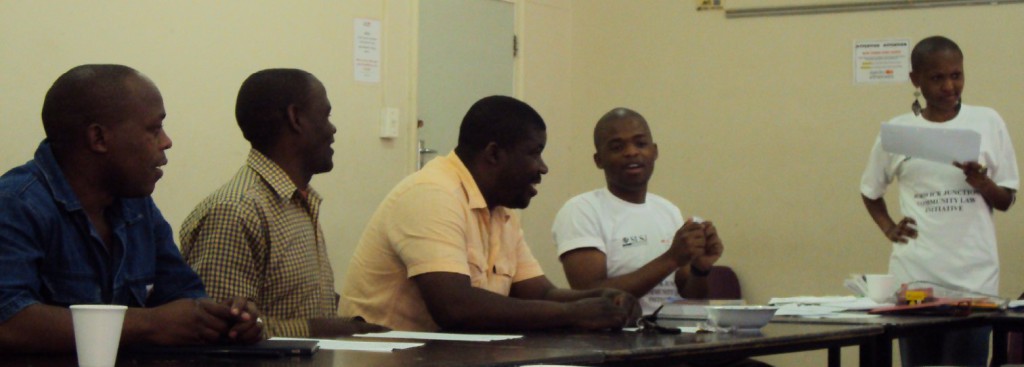Tasmi Quazi & Mkhululi Nonjola
On the 18 October 2010, around 14 trader leaders from different informal trader organisations and street committees from Warwick attended a ‘Street Law’ seminar that was organised by the NGO Asiye eTafuleni (AeT) and facilitated by University of KwaZulu-Natal’s (UKZN) 3rd & 4th year Law students as part of the UKZN Community Law Initiative. The topics that were discussed during this seminar included; general law, law and people working in the informal economy, community organising and law, citizen arrest and law, and lastly gender equality and law. For a summary of the seminar, click here.

The purpose of the street law seminars was to empower informal traders through learning about their rights as South African citizens, particularly as traders, and to demystify perceptions that legal services are too expensive and beyond access to lower socio-economic groups. As a result of the positive responses from the traders, AeT has entered into its second year of offering this seminar into 2011.
This is a reflection about the seminar from AeT’s Law Intern, Mkhululi Nonjola:
I chose street law as my final year public interest law elective because of its practical nature and the opportunity to deal with law on the streets. Little did I know then, that I would literally be involved with informal traders working on the streets and confronted with the legal predicaments faced by them on a daily basis. The street law lessons organised with Asiye eTafuleni were one of a kind for many reasons and that is what made the experience worthwhile.

Unlike my previous experiences in teaching street law lessons, here the exercise had with it the live opportunity of producing positive results – as the people were going to take something out of it, take it back to their communities and constituencies and spread the message. This is what I had always wanted, making a difference, regardless of its magnitude. The informal traders participated and were cooperative throughout the sessions. They knew of ‘law’ as it is applied on the streets – not how it is professed to us at law school. So we got to learn too.
I have to admit that my attitude towards informal trade was not always positive before this experience; even though my late aunt was once an informal trader. However, during the street law lessons, I got exposed to the lives of informal traders and I got to appreciate that it is an important sector in our economy, catering for thousands of entrepreneurs and feeding millions of households – all deserving better treatment than provided by our government and its officials.

